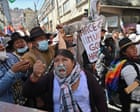Fatal clashes between police and supporters of former presidentEvo Moraleshave deepened Bolivia’s political and economic crisis, heightening tensions in the Andean country just two months before the presidential election.
Six people have been killed and more than 300 injured in weeks of unrest. The dead include four police officers, one of whom was reportedly killed bydynamite which had been strapped to his body.
Demonstrators have blockaded roads across the country since 2 June in response to rulings by the constitutional and electoral courts that barred Morales, 65, from seeking a fourth term in the 17 August election.
On Sunday the protestersannounced a “humanitarian pause”at the blockades, but someremained in place, prolonging a two-week-long disruption in delivering food, medicine, and fuel.
In response to the protests he called, Morales has himself become the target of a new“terrorism” investigation, announced by the government of current president Luis Arce, 61 – who served as finance minister under the former president and is now his main rival.
Moraleshas been entrenchedsince October in the coca-growing region of Chapare, wherehundreds of coca farmersare preventing police and military forces fromexecuting an arrest warrantover allegations that Moralesfathered a child with a 15-year-old girlduring his presidency in 2016.
“Democracy in our country is at risk,”said President Arcefollowing the killing of the four police officers.
Three officers were shot dead by protesters last Wednesday in the mining town of Llallagua, where a 17-year-old student also died, reportedly beaten to death by protesters whoaccused him of being a police informant.
The fourth officer was in a village in the Cochabamba department when, according to the government, he was “kidnapped by a mob” and killed with dynamite strapped to his chest. In the same village, a civilian was shot dead by what the government claims was gunfire from protesters.
“[The officers] were Bolivians who gave their lives at a time when the country is under siege, facing the risk that elections might not be able to take place,”said Arce.
The UN human rights office has called for an“impartial and thorough” investigationinto the deaths.
Morales, who had defended “mobilisation and blockades” as “legitimate expressions of resistance,” later said he is an “enemy of protests” and claimed that“what happened in Llallagua was well staged”to incriminate his supporters.
“It’s crazy for him to say that, because he is the ‘father’ of the blockades: he built his entire political career blocking roads,” said economic analyst Gonzalo Chávez Alvarez, a professor at the Universidad Católica Boliviana.
Morales is barred from running by a constitutional court ruling that reaffirmed the constitution’s two-term presidential limit and by the electoral court, which argued that his party is not officially registered.
Bolivia’s longest-serving leader governed from 2006 to 2019. After about a decade of prosperity driven by a natural gas boom, reserves had dwindled, and an economic crisis began.
In 2019,he sought a fourth term; there was a blackout during the vote count, and when it resumed, it showed him as the winner. The countryerupted in violent protests, and Moralesfled to Mexicoand later to Argentina.
After his protégé Arce won the presidency in 2020, Morales returned, butthe two soon fell out.
Under Arce, the economy has deteriorated, and the country is now facing its worst economic crisis since the hyperinflation of 1985, withinflationand ashortage of US dollars and fuel.
Deeply unpopular, the president reversed his decision to seek re-election and now backs his former interior minister, 36-year-old lawyer Eduardo del Castillo.
Even within the left, he will face competition from the equally young senate president, 36-year-old Andrónico Rodríguez, once seen as Morales’s natural heir due to his Indigenous roots and leadership in the coca growers’ union, but now treated as a traitor by the former president.
On the right, businessman Samuel Doria Medina, 66, and former president Jorge “Tuto” Quiroga, 65, are polling well, and will try to oust the Movimiento al Socialismo (Mas) party after nearly two decades in power.
Meanwhile, police and military forces have so far failed to execute the arrest warrant against Morales over the allegation of statutory rape.
Last week, all other presidential candidates except him met in the capital, La Paz. At the end of the meeting, the head of the electoral court, Óscar Hassenteufel, pledged that elections wouldgo ahead “without fail” on 17 August.
“Morales wants to enter the elections at all costs, and he won’t succeed,” said economist Alvarez. “So there’s uncertainty over whether the elections will really happen because it’s hard to say whether Morales will have enough strength to stop them.”
